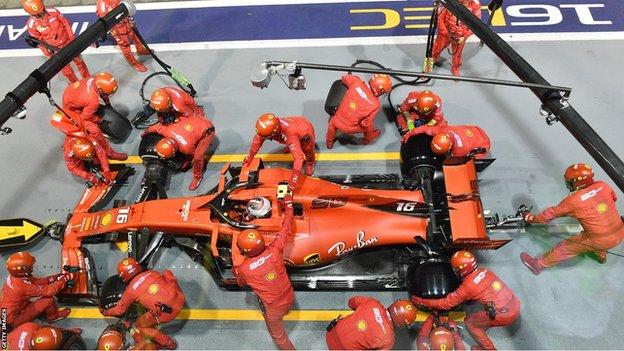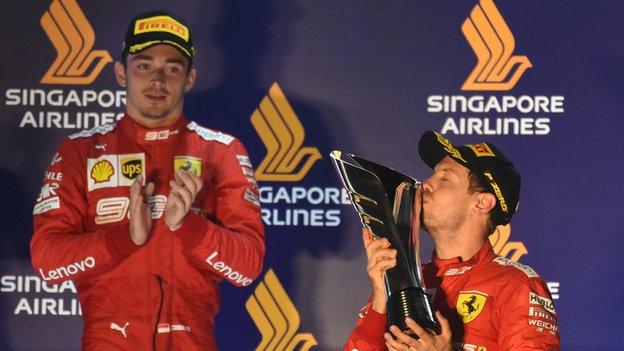
Sebastian Vettel badly needed a win after a drought stretching back more than a year, and getting one in Singapore - even if it came about in slightly fortunate circumstances - will have done wonders for his confidence.
The race yielded the perfect result for Ferrari - a one-two - and probably the perfect order for them as well, whether that was intentional or not.
The pressure has been mounting on Vettel all year, but it has become intense since Formula 1 returned from its summer break, as team-mate Charles Leclerc took victories in Belgium and Italy and Vettel made the latest in a series of errors at Monza.
For Ferrari, the upside of this could be huge.
Finally, in Singapore, Vettel was smiling again after the race. He drove perfectly once out front and looked back to his best in terms of race performance.
The confidence he can take from ending his year-long drought of victories and hushing some critics should give him a boost heading to Russia this weekend.
And if Vettel can now respond and raise the bar within the team even higher, the whole Ferrari team can find performance in it.
With the latest one-two finish continuing their clean sweep of races since the summer break, they are marking themselves out as serious contenders and a threat to the Mercedes dominance, if not for 2019, then for next year.
Nothing focuses the mind like your team-mate doing a better job than you. It's the ultimate benchmark - someone who has the same equipment who is ultimately performing to a higher level.
It means you dig deeper and find time you didn't think possible. And right now Vettel is probably having to do this on the regular basis.
After years of beating former team-mate Kimi Raikkonen with ease, Vettel would have been assuming he was getting the most out of the car. But Leclerc has come in and the bar has been raised.
Vettel had already shown signs before the race in Singapore that he had raised his game. He set the pace on the first runs in final qualifying - and it was Leclerc who had to go out and do better to take pole, which he did with a lap right on the ragged edge.
Vettel's race was strong, but he needs to be at the front from the start to take further opportunities, at circuits where the race pace won't be as measured and reduced as it was in Singapore.
He wouldn't have won this one had either Ferrari or Mercedes executed better race strategies. Leclerc should have won, from Hamilton and then Vettel, as they had qualified and started the race.

Ferrari made mistakes with their pit strategy, even if it turned a one-three into a one-two
The fact Vettel won and not Leclerc came about as a consequence of some questionable actions from both Ferrari and Mercedes during the race.
Firstly, people will point to the fact that Ferrari turned a one-three into a one-two. On paper, that looks like genius from the pit wall.
But if Mercedes had pitted Hamilton when Ferrari pitted Vettel - as Hamilton was asking them to do - then Hamilton would have won the race, and Ferrari would have looked stupid for not pitting Leclerc to cover off the race lead.
In Singapore, with everyone measuring their pace at the front to look after the tyres, the teams are all looking for a gap to open up back in the field, so they can pit, put on fresh tyres and run in clear air at their own pace. Do this right, and you will emerge ahead of someone who pits later than you, and win the race.
This is what Ferrari did with Vettel, with the idea of getting him ahead of Hamilton. But Mercedes should have done the same on the same lap, and then Hamilton would have won the race.
Vettel would not have got ahead of Hamilton, and it would have been Hamilton who leapfrogged Leclerc.
Secondly, Ferrari did not tell Leclerc that Vettel had pitted. Had he known, Leclerc would surely have been able to raise his pace and likely would have stayed ahead of his team-mate. This was a source of major frustration for the youngster after the race.
But Ferrari, in their defence, didn't expect Vettel to find more than the 3.5 seconds that he needed to jump Leclerc in just one lap.
Ferrari did the obvious thing to pit Leclerc the lap after Vettel, with the thought that he would emerge ahead of his team-mate. But Vettel had put in a storming out-lap, using all his experience to know how critical the pit-stop phase of the race can be, and emerged ahead.
At this point Hamilton could have pitted and covered off Red Bull's Max Verstappen, who was running behind him. But because he had already lost ground to the Ferraris, Mercedes chose to allow Verstappen through as well, in order to have better tyres for the end of the grand prix. This was the second mistake in a poor race for their pit wall.
So Vettel took command of the Grand Prix as Leclerc had done in the opening stages, controlled the pace, and was impressive with his commitment in dispatching the slower midfield runners who hadn't yet pitted.
This was an awkward situation for Ferrari.
It is very unusual for a team to do a strategy that leapfrogs their second driver over their first, which is why it was so contentious, and why Leclerc was unhappy.
But ultimately they were heading to a momentous one-two. And while the man who deserved to win the race was going to end up in second, he was behind a man who desperately needed a race win.

Sebastian Vettel ended a 13-month win drought with victory in Singapore
In terms of performance, did this mark a change inside Ferrari?
Ultimately, no.
Leclerc is still the faster of the two Ferrari drivers. He has out-qualified Vettel in the last eight races, and would have had a hat-trick of wins without Ferrari's strategy inadvertently favouring the German.
The downside for Ferrari is that alongside a happy Vettel, they will have an agitated Leclerc. He is young and hungry, and always searching for more wins, especially ones he believes he has deserved, in a glamorous, tricky and gruelling race.
Mercedes have a situation where Hamilton is number one and Valtteri Bottas is number two - not contractually, I'm sure, but dictated by performance. It's very clear and that was evident in Singapore last time out as well, where Bottas was used to protect Hamilton's track position before his stop.
For the sake of their team performance, Ferrari need their drivers to push each other hard. But, critically, they need to keep it above board - which is threatening to become a problem.
Tensions were already raised early in the season, with a series of questionable team-orders calls, which were largely in Vettel's favour. Ferrari even asked Leclerc to delay passing Vettel when he was much faster in Bahrain, an order Leclerc ignored.
That situation dissipated through events more than anything else. Ferrari's title hopes faded, so the need to ensure one driver maximised his own personal points tally was reduced. And similar scenarios were happening less often in races.
But then it reared its head again when Leclerc failed to give Vettel a tow at the end of qualifying in Monza, when Vettel had kept to his side of the bargain by towing Leclerc moments before.
Vettel was unhappy. It was discussed behind closed doors. And after that, tensions were high and you could feel a bit of a grudge coming from one side of the garage to the other.
Ultimately, though, with Vettel undoing his own Monza race early on, this was overlooked, as Leclerc won, just holding off the attacks of Hamilton and Bottas.
But now Ferrari's strategy has taken a win from Leclerc and handed it to Vettel, the shoe is on the other foot, and Leclerc was quite rightly unhappy about it.
For now, it seems Ferrari just about have their drivers under control. As personalities both Leclerc and Vettel are mature and respectful, without the super-egos of some others, and they seem prepared to accept that the team comes first.
There have been a few flash points this season, but in the end both Vettel and Leclerc, after some heated comments in the car, calmed down after the race and played the team game.
This should help in achieving a decent team harmony, but there are hints that it might not last forever.